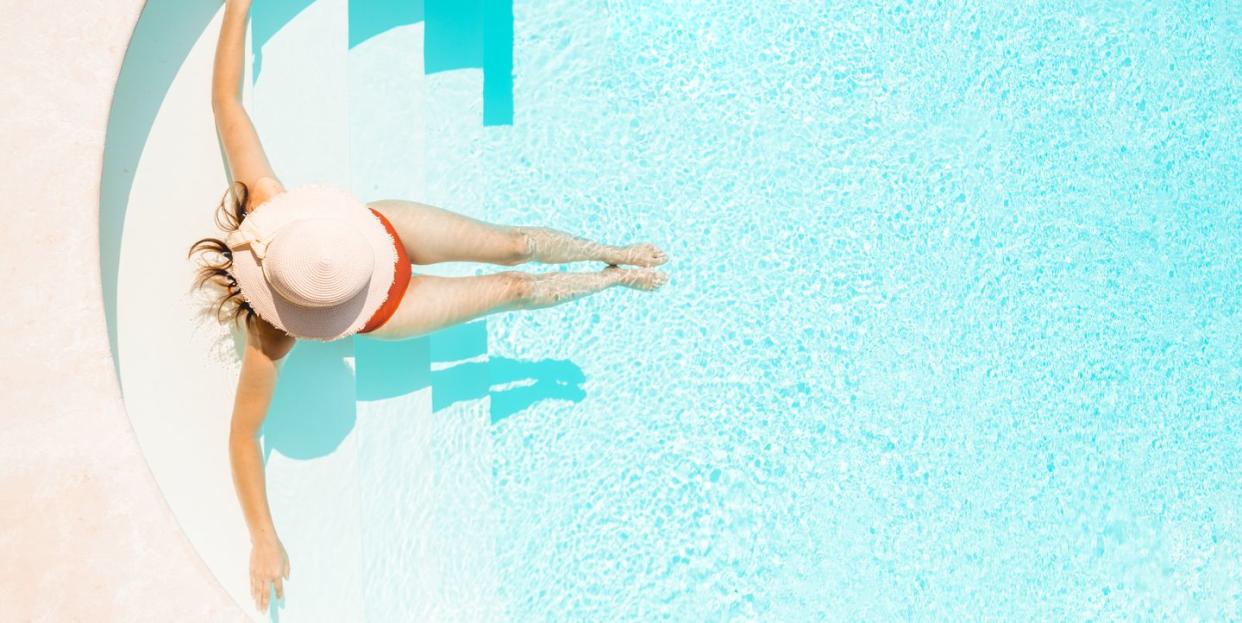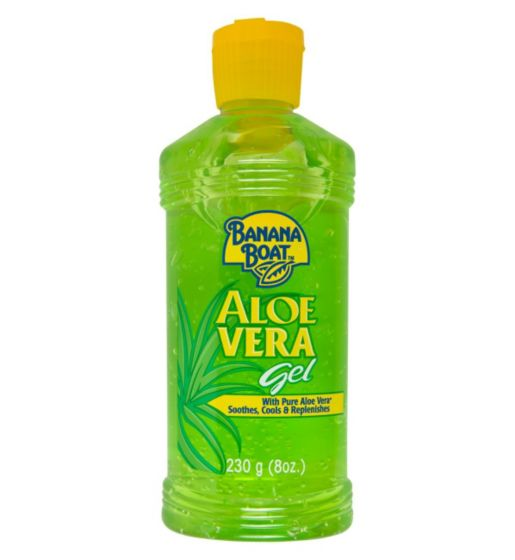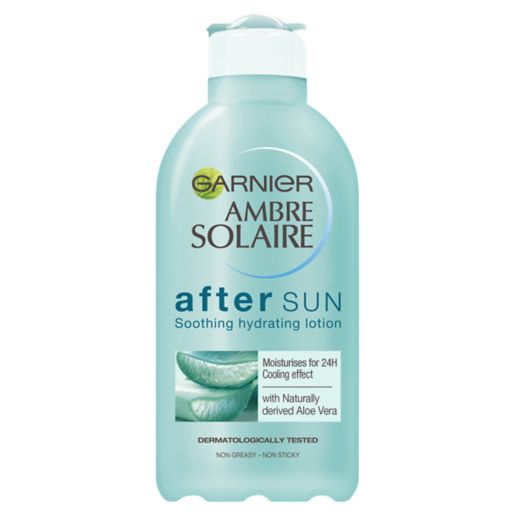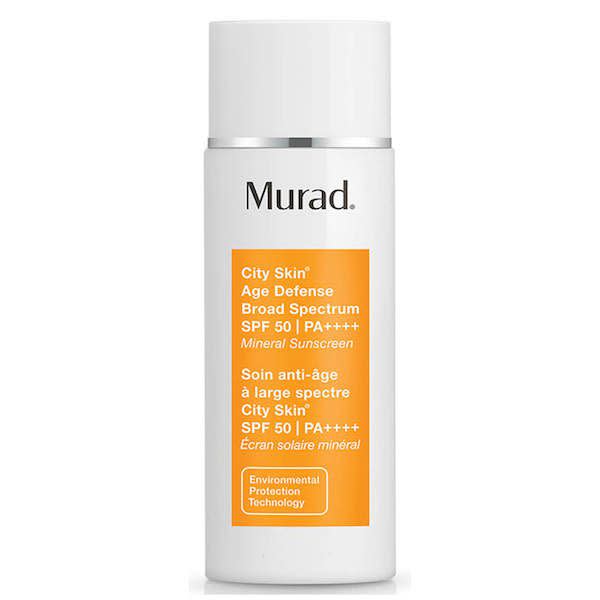How long does sunburn last?

We all know the damage the sun can do to our skin, but we're also guilty of wanting to soak up those warming rays when they finally arrive. This can cause sore, pink, sunburnt skin.
Luckily, Dr Murad, board certified dermatologist and founder of Murad skincare, is on hand to help answer our burning questions (sorry!) about sunburn, including how long sunburn lasts, what we can do to soothe sunburn, and how to protect our skin against getting sunburnt again.
What is sunburn?
As Dr Susan Mayou, a consultant dermatologist at the The Cadogan Clinic in London, explains: 'Sunburn occurs when UV radiation from the sun damages epidermal skin’s DNA and leads to cell death. At a cellular level, sunburn is associated with microscopic changes in the skin and inflammation.'
She adds: 'Symptoms of sunburn can include pink or red coloured skin, swelling, tenderness and irritation, skin feeling hot to touch, pain and – in severe cases – blistering and fever.'
If you want to soothe and heal sunburn quickly, read Dr Mayou's top tips here.
How long does sunburn last?
'Generally a sunburn can last for days depending on severity and skin type,' Dr Murad says. 'The best course of action is to intensively hydrate and soothe the skin as much as possible.'
What can we apply to the skin to help soothe sunburn?
'To help treat skin issues topically post-sun exposure, look for products that contain anti-inflammatories, antioxidants, and hydrators that help calm and soothe skin,' Dr Murad says. 'This includes Goji Berry Extract, Pomegranate Extract, Aloe Vera and Peppermint Leaf Extract.'
We earn a commission from products purchased through some links in this article.
BUY NOW £6, Banana Boat Aloe Vera Gel

BUY NOW £6, Garner Ambre Solaire After Sun Lotion

Dr Murad adds: 'Additionally, products containing antioxidants such as Vitamin A and C are essential to use on a daily basis to protect and promote cell strength. Building stronger, healthier skin cells helps diminish the occurrence of unwanted pigmentation, as does being sun-smart.'
Is tanning damaging?
'All tanning is damaging,' Dr Murad says. 'Although skin cancer has been associated with UVB radiation and sunburns, even tanning in moderation produces the same harmful effects, as would a burn.
'Tanning causes premature ageing, causing the skin to appear leathery and wrinkled, and also damages the immune system. If you insist on having a tan, the only safe alternatives to sunbathing and tanning beds are self-tanners, spray tans and bronzers.'
BUY NOW £28, St Tropez Self-Tan Express Bronzing Mousse

Does a 'base tan' protect from burning?
'The idea that a “base tan” will protect you from sunburn is false. That’s why sunscreens should be applied daily and continuously throughout the day – both indoors and outside to keep your skin well-protected,' Dr Murad says.
What ingredients should we look for in a sunscreen?
'Sunscreens should always include hydrators, anti-inflammatory agents and antioxidants as these products will also help repair the skin’s barrier to make it better able to defend itself from the sun and other environmental aggressors, like bacteria and pollution,' Dr Murad says.
BUY NOW £35, Murad Oil-Free Broad Spectrum Sunscreen
'To optimise skin hydration, look for sunscreens that contain Hyaluronic Acid and glycolipids to attract moisture to the skin barrier', he adds.
'Liquorice Extract is an important anti-inflammatory agent to look for in sunscreens. Pomegranate Extract is both an anti-inflammatory and one of the most effective antioxidants when it comes to sun protection, as this ingredient helps protect skin from free-radical damage.
'The actual measurement of an SPF only relates to the sun’s UVB rays (the skin burning rays), therefore we need to ensure the sun screens we are using contain broad spectrum protection. This also includes UVA protection, which importantly is the skin ageing ray, so by protecting ourselves against UVA rays we are helping to prevent premature skin ageing.'
What number SPF should we buy to prevent sunburn?
'SPF relates to your natural burn time e.g. if natural burn time is ten minutes without sun screen protection, you can multiply that time by the SPF,' Dr Murad says.
'It’s important to remember: the higher the SPF means the longer the protection, not the stronger the protection. So once that time period has elapsed, reapply! And remember other factors may reduce the protection levels, like water, sand, clothes, perspiration – so if in doubt about your SPF protection, then reapply!'
Is there anything else we can do to prevent sunburn?
'You should also protect your skin from the inside by giving it the nutritional building blocks of good cellular health,' Dr Murad says. 'Eat raw fruits and vegetables – the more colourful the better – because they are full of skin-protective antioxidants and have a high-water content, which helps keep your skin’s barrier hydrated and more resistant to free-radical damage from the sun and daily pollution.
'Also, consider taking supplements with pomegranate extract. This provides you with powerful antioxidant protection against free radical damage, which accounts for more than 80% of the signs of premature ageing. There is evidence that pomegranate extract can even boost the efficacy of SPF in sunscreens.'
BUY NOW £20, True Veda Organic Pomegranate Capsules

How important is it to wear an SPF every day, even in winter?
'It is important to make sure that you are using a broad spectrum sunscreen daily that blocks both UVA and UVB rays,' Dr Murad says.
BUY NOW £60, Murad City Skin Age Defense SPF 50

'While UVB burning rays are stronger in the sun, ageing UVA rays are the same strength all year round and can penetrate cloud. Remember, SPF only refers to the burning rays so you need to look out for products that provide broad spectrum protection which offers both SPF and PA rating to ensure you’re protected.'
('You Might Also Like',)


